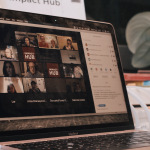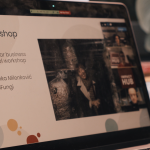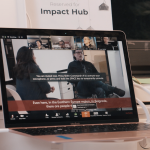Virtual conferences in CEE region
What if conferences could happen without consuming time and CO2 emitting travel? In 2018 and 2019, Impact Hub and WWF jointly pioneered a virtual conference in Central and Eastern Europe that was carbon-free and gathered 360 participants.
Virtual conferences create space for connection, learning, idea development, and innovative action. They can also complement or even reduce the need for in-person meetings. In 2018 and again in 2019 WWF, Impact Hub and other partners like Move.BG and the BMW Foundation hosted a joint virtual conference across six countries in Central and Eastern Europe to discuss themes like female entrepreneurship, impact technology and circular economy.
How did it work?
Together with multiple Impact Hubs and WWF offices, we explored two questions:
- What if conferences could happen without time-consuming and CO2 emitting travels? Some people spend 6 out of 8 hours of their day in video calls – why not take this to the next level?
- How could the CEE region be empowered to realize their potential? Can we help citizens to imagine a future they would like to work towards?
Then, in November 2018, Impact Hub, Move.bg and WWF jointly pioneered a virtual conference in Central and Eastern Europe. Over 150 people joined and gave great feedback: the 34 speakers were high-class, the variety of sessions was received enthusiastically, and many people even left with the idea of hosting a virtual conference themselves.
Combining both editions, 360 participants had the opportunity to hear from and interact with speakers from across the region, and take part in the conversations. Additionally, in 2019, we hosted in-person gatherings for participants in key cities across the region to discuss the themes of the day and build further connections.
2018 edition: Re-imagining the Future
In 2018, the vision was to host an event with 3 tracks as part of the Disruptive Innovation Festival (DIF) that aimed to sketch a positive vision for Central and Eastern Europe, and empower citizens by showcasing impactful initiatives from and for the region. Its name was then Re-imagining the Future.
The focus was on Hungary, Bulgaria, Romania, Croatia, Serbia, Czech Republic and Ukraine, and anybody else interested in the topics or the region was more than welcome to join the conversation. 34 speakers shared their expertise, 260 people signed up (showing the great interest), and over 110 participants joined us virtually during the two event days. All of the participants attended free of charge – impact first.
The three tracks were: 1) Community-lead Change: Reshaping society from the ground up; 2) Impact Technology: Redefining the potential of technology and 3) Female Entrepreneurship: Empowering women to start and grow their businesses. The event was such a success that a second edition was planned for 2019.
2019 edition: Virtual Conference on Circular Economy in Central and Eastern Europe
Then, in the 2019 edition, we asked – Can a circular economy save the planet? And in November 2019, seven countries came together for the virtual conference to share, discuss and act. We’re facing massive environmental challenges around the world. Whereas unsustainable consumption and production create heaps of waste, the idea of a circular economy (CE) tries to break that cycle. CE opportunities around the world are on the rise – but the CEE region seems to be left behind. Collaboration across organisations, sectors and countries is necessary to create a positive narrative for the future.
Over the course of three days, innovators, social entrepreneurs, thinkers, CE practitioners and students learned about local realities from experts in the field, explored how to establish circular models to work within planetary boundaries and discussed the application of circular economy in many aspects of life, like circular living, working and design.
Check out our summary video here and our e-magazine developed by Think Visual below – it captures the key insights of the entire event using inputs from everybody who took part:
Why CEE?
All the partners felt like there was need to bring the region – its citizens, its changemakers, its NGOs and its institutions – closer together, and tackle three hindering factors for positive change:
1) The missing goals for actors to jointly work towards;
2) The belief that it’s difficult to initiate solutions in the region, and
3) The lack of collaboration across organizations, sectors and countries.
A simple Zoom link unlocked opportunities for participants to network, learn, share and collaborate
On both editions, participants were able to register via an Eventbrite link and select if they want to join the for the whole conference or only on specific days. Over the course of the days, participants were able to participate by accessing Zoom links to interactive formats (including panels, Worldcafe, workshops, breakout conversations and ‘speed-dating’).
Learn more:






